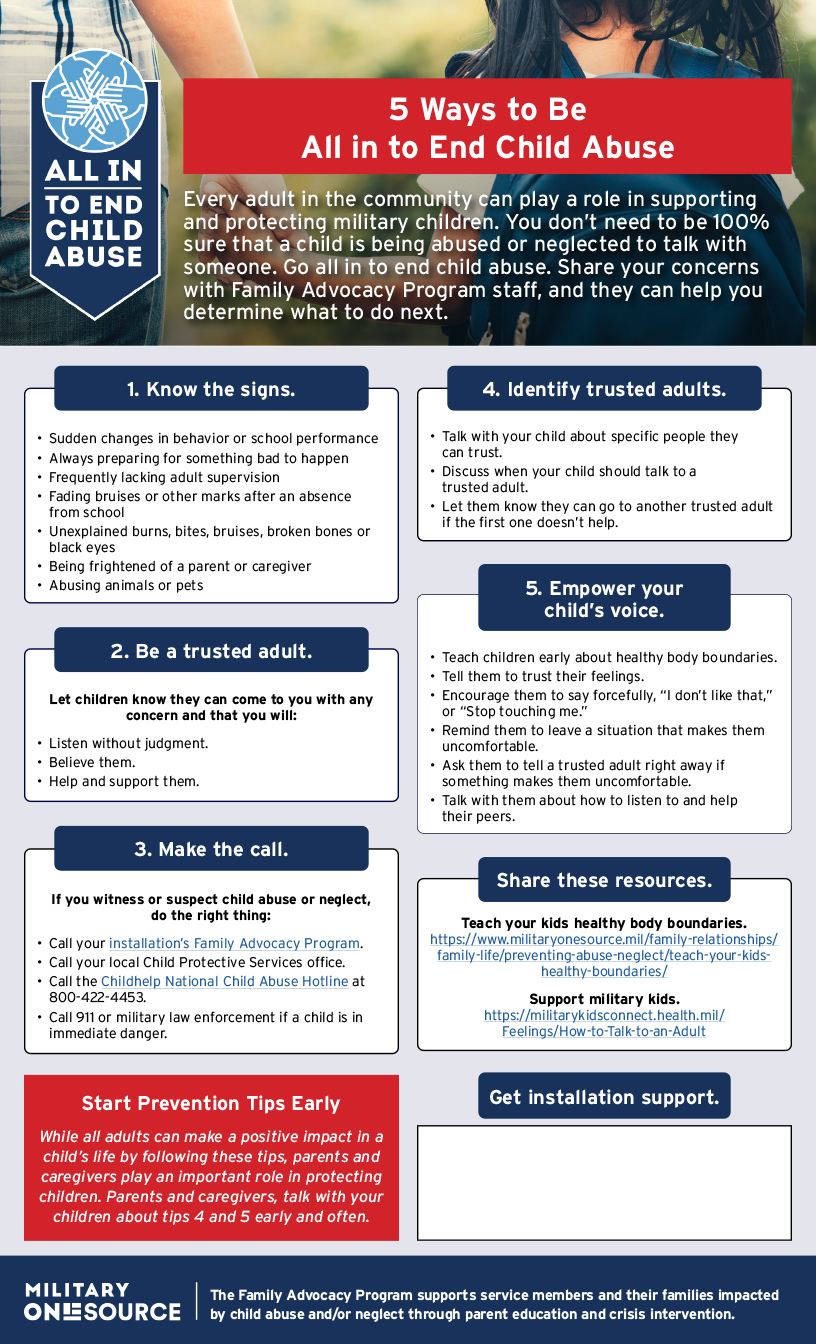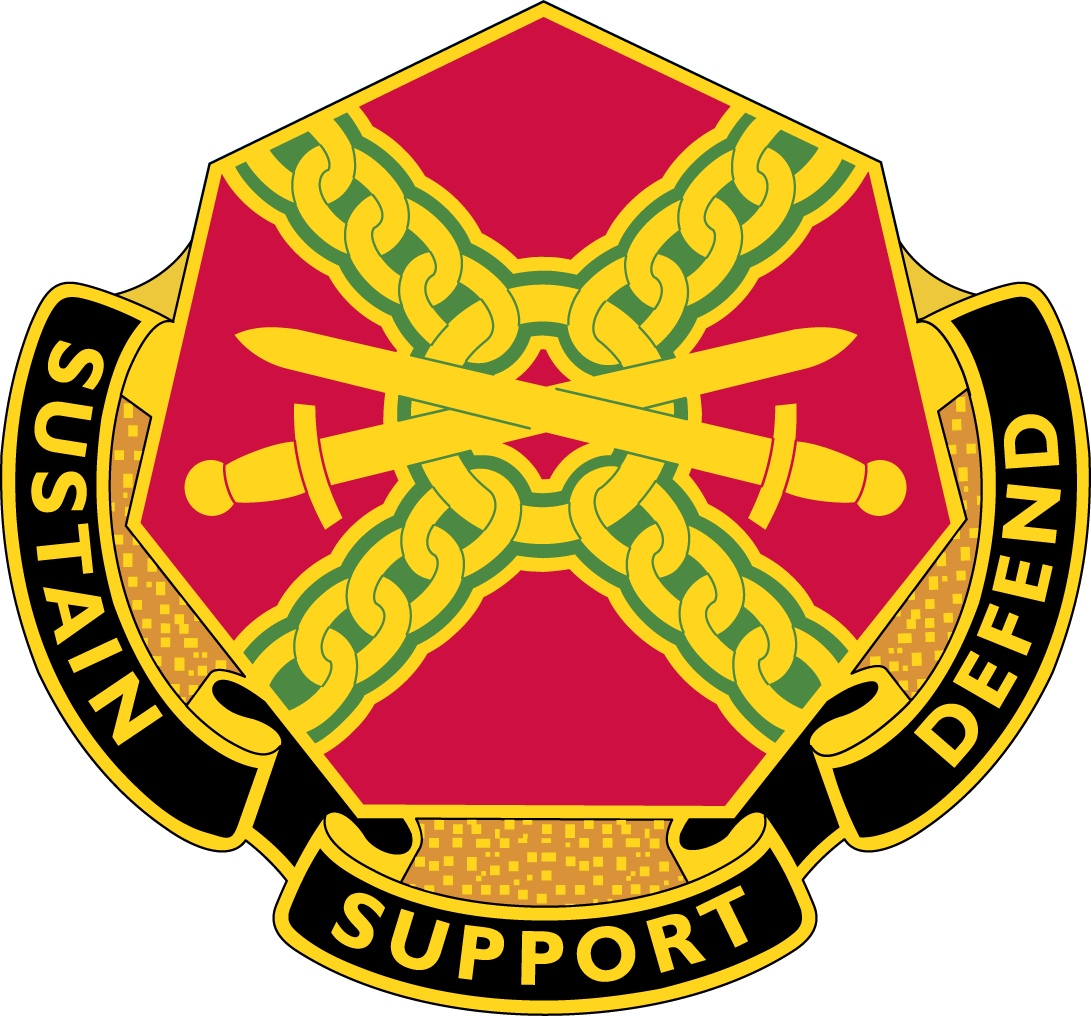The Family Advocacy Program is committed to the strong Army Families, and the prevention and treatment of family violence. Its coordinated efforts are designed to prevent and intervene in cases of family distress, and to promote healthy family life. The mission of the Family Advocacy Program is to support the foundations of family well-being in order to strengthen Soldiers and Families, promote child safety, and prevent spouse and child abuse and neglect. We envision Army families with strong parenting and relationship skills that enable them to cope with the stresses of military life in a healthy manner.
Important Phone Numbers:
717-245-4357 (Program Information)
855-827-0400 (Restricted Reporting)
717-245-3775 and 717-962-5267 (Report Abuse)
The program conducts special events such as Child Abuse Prevention Month in April and Domestic Violence Awareness Month in October.

Domestic Violence Assistance and Prevention
What is partner Abuse?
A pattern of behavior resulting in emotional/psychological abuse, economic control, and/or interference with personal liberty that is directed toward a person of the opposite sex. Spouse or partner abuse can include something as obvious as a slap or a hit, but also includes less noticeable controlling, threatening or emotionally abusive behaviors. No one needs to stay in a relationship where they are being physically or emotionally abused by their partner or spouse.
I suspect that my friend is a victim, what can I do?
The Family Advocacy Program can give great tips and information on how to help a friend. Please consider referring a friend to professional help by asking them to contact the Family Advocacy Program or contact Social Work service. Do not attempt to "take care of things" yourself. Domestic violence can be a very complex and potentially dangerous issue.
What about my privacy?
The military is committed to finding ways for victims of abuse to get the best, most private help possible. In many cases an abused partner can receive completely private help depending upon how severe the situation is, if they first contact either a victim advocate, or a health care provider at one of the on-post clinics or outside community hospitals . In cases where there is an obvious danger of imminent threat of harm or the presence of child abuse, a care provider may have to notify others to ensure the safety of all persons involved in an abusive situation. Anyone needing information or help for partner or spouse abuse, who is worried about being reported or about their privacy, should still call someone. Victims can ensure their privacy by not giving their name until they feel completely informed about the best options they have for getting help. Contact a Victim Advocate at (717) 245-3775 to find out more about victim privacy.
Help for an abusive partner
Many spouses would like to find help for their abusive partner and many abusive partners may welcome this support. There are many counseling options and support groups in the community. Personnel at any of the listed numbers can provide information on help available. If a partner is being physically abusive, marriage or couples counseling is often not a good choice, but there are many other very good options for help.
What is the commander's role?
Commanders and other leaders are required to report family violence, to seek help for all parties involved and to help ensure safety to the fullest extent possible. Commanders and the military or local police can provide a great deal of effective help, including documenting the abuse, arresting the offender, helping with securing a military or civilian no-contact/protective order to ensure the victim is safe, helping to find legal assistance and ordering an offender/soldier to treatment. Although commanders and leaders are concerned about the safety of families in their units and cannot fully ensure this safety unless they know about abuse, they also understand that many victims will never come forward unless they are provided an option to keep their situation completely private.
How are my children affected by domestic violence?
Children usually know something is not right, even if they haven't been in the room during a family violence incident and may show different reactions according to their age. Most offenders have learned their behavior from growing up in an abusive home of their own. Younger children may exhibit self-blame that can precipitate feelings of guilt, worry, and anxiety. Children may become withdrawn, non-verbal, and exhibit regressed behaviors such as clinging and whining. Eating and sleeping difficulty, concentration problems, generalized anxiety, and physical complaints (e.g., headaches) may also occur. If you would like to find out more information, please contact our office.
Domestic Violence Resources
Contact Numbers
- Domestic Violence Services of Cumberland/Perry County (24 hour hotline): (800) 852-2102
- Family Advocacy Program: (717) 245-3775
- Victim Advocate: (717) 962-5267
- Victim Advocate After Hours: (855) 827-0400
- Carlisle Hospital Emergency Room: (717) 249-1212
- Social Work Service: (717) 245-4602
- Chaplain's Family Life Center: (717) 245-3318
- DA Police: (717) 245-4115
Reporting Options
- Restricted - Allows victims the option of receiving medical treatment, advocacy, and counseling without triggering the official investigative process or command involvement.
- Unrestricted - Victims receive medical treatment, advocacy, counseling and an official investigation of their allegation. This option ensures the widest range of rights and protections to the victim.
Do you suspect child abuse or neglect
If you suspect that a child is being neglected or abused contact:
- Social Work Service/Family Advocacy: (717) 245-4602
- Pennsylvania Child Line: (800) 932-0313
- Department of Family and Children Services (717) 240-6120
Crisis Intervention Hotline
The FAP Manager provides immediate intervention to family members on the resolution of an immediate child abuse/neglect or spouse abuse problem, protecting the victim and preventing further maltreatment through the use of community, medical, and legal resources. CONTACT the 24 hour hotline at 1(800) 852-2102.
Command Education program
Commanders at all levels will receive a desk side briefing within 45 days of assuming command on the FAP and Sexual Assault Program. Information will be provided on FAP policies, procedures, and available resources, command responsibilities in the areas of identification, reporting, coordination, rehabilitation, and administrative or judicial options.
Lending Library
A wide array of videos, audio cassette tapes and books on parenting and relationship issues may be borrowed.
Victim Advocacy
The Victim Advocacy Program provides comprehensive assistance and support to victims of spouse abuse, including crisis intervention, assistance in securing medical treatment for injuries, information on legal rights and proceedings, and referral to military and civilian shelters and other resources. The Victim Advocate will ensure victims are properly advised of their options for restricted and unrestricted reporting.
Parent Education Program
This program involves education that is designed to enhance parenting and child management skills. Parent education and support groups may be combined to provide a forum for parents to exchange ideas, information, and resources and to practice new behaviors. The program also may reinforce or teach basic skills in physical care, protection, supervision, and psychological nurturing appropriate to a child's age and stage of development.
Respite care
Respite care is temporary child care for the purpose of relieving parental stress and to provide a nurturing and developmentally appropriate environment. Families may receive respite care when both soldier and spouse attend parenting classes, counseling, support groups, or are experiencing stress from deployment related or family issues. Respite care will not be used in place of foster care or abandoned children. Call (717) 245-3775 for more information.





